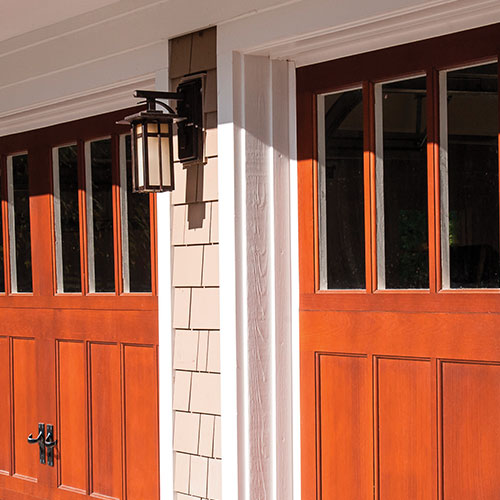Added durability for your doors
Insulated garage doors can add extra protection for your home while shielding your garage from the elements. That extra layer between the front and back of the door helps regulate temperature and strengthens it to withstand wear and tear for longer.
While it’s your prerogative to go with either insulated or uninsulated, we’ll break down the differences and why you may want to consider choosing an insulated door.
Insulated vs Uninsulated Doors: Material and Construction
Uninsulated doors consist of a single material layer. Whether you choose vinyl, wood, or glass, these doors have one sheet of that material to create a barrier between indoors and outdoors.
Insulated garage doors are referred to as double-layer or triple-layer garage doors because they’re built out of multiple material tiers that alternate between the door material and either polystyrene sheet insulation or thicker polyurethane insulation.
Door Durability: Insulation Strengthens Your Garage Door
In many cases, we recommend homeowners go with an insulated door for the strength factor alone. Why? In an insulated garage door, there’s more layers of material backing the door, so it’s significantly stronger than a single-ply version.
This added thickness and durability allows insulated garage doors to better withstand everyday wear and tear and hold up to minor impacts better than an uninsulated door.
This also means insulated doors are likely to last 10 years or more. In comparison, uninsulated doors tend to require replacements more often.
Insulated vs Uninsulated Doors: Price
Because insulated doors are more durable and of higher quality, you can expect to pay more (on average a couple hundred dollars more) than you would for a single-layer door.
But if you factor in things like how long the door will last and how insulated doors can save you money in other areas, in most cases, investing in an insulated garage door will save you money in the long run.
Insulated Doors Save You Money on Energy Bills
When you consider the construction of your garage door, think of it as a moving wall. The only problem is that this moving wall allows air to flow in and out, so all the warm or cold air that you’re paying for is going right out your garage door opening.
An insulated garage door is better at trapping heat or cold air inside, so it doesn’t escape and rack up your energy bill.
The air in your garage may be a few degrees different from the temperature inside your home but creating a buffer between the outdoors and the inside of the house means your heater or AC won’t need to work as hard. In the long run, that results in more energy savings for you.
Insulated vs Uninsulated Doors: Extreme Climates and Garage Utility
If you live in a climate that experiences intense heat or cold, choosing an insulated door will be a better option. Think about summer’s sweltering heat, or winter’s frigid chill. With a single-layer garage door, your garage becomes wasted space, taken over by the extreme temperature.
Homeowners who have an insulated garage door can still use their garage, even when the temperature outside is beyond (or below) their comfort zones.
If you like to use your garage as a space for more than just parking your car, this is a key factor to consider. Garages that double as at-home gyms, workshops, or band practice spaces are best off with insulation.
Garage Door Noise Level
Most insulated garage doors tend to rattle less and operate more quietly overall. The insulation in the door works to act as a soundwave absorber, so the opening and closing of the door is less noticeable from the inside of your home.
If your garage shares a wall with an area of your home that you wish to keep quiet, or has a bedroom located above it, this may be even more important to you. The opener drive style you choose for your garage will also contribute to the door’s noise level.
Choosing an Insulation Level for Your Garage
When selecting the right insulation level for your garage, these tips will help you get started:
About R-value: A garage door’s R-value is the measure of its insulation thickness. The higher the R-value, the more effective the insulation in the door. For example, a standard wall in a house has an insulation R-value of roughly 11.
Match R-values: You want to make sure that your garage door either meets or exceeds the R-value of the walls around it for it to be the most effective.
If your garage is attached to your home and you use it frequently, you’ll want to consider a higher R-value than you would if your garage is a separate unit. You’ll also want to opt for a higher R-value if you live in a cold climate. You’ll want to trap as much warm air in as possible, and a garage door that’s well-insulated will do this.
If you have specific questions about choosing the right garage door for your home, you can contact your local Precision Garage Door for a free consultation.

